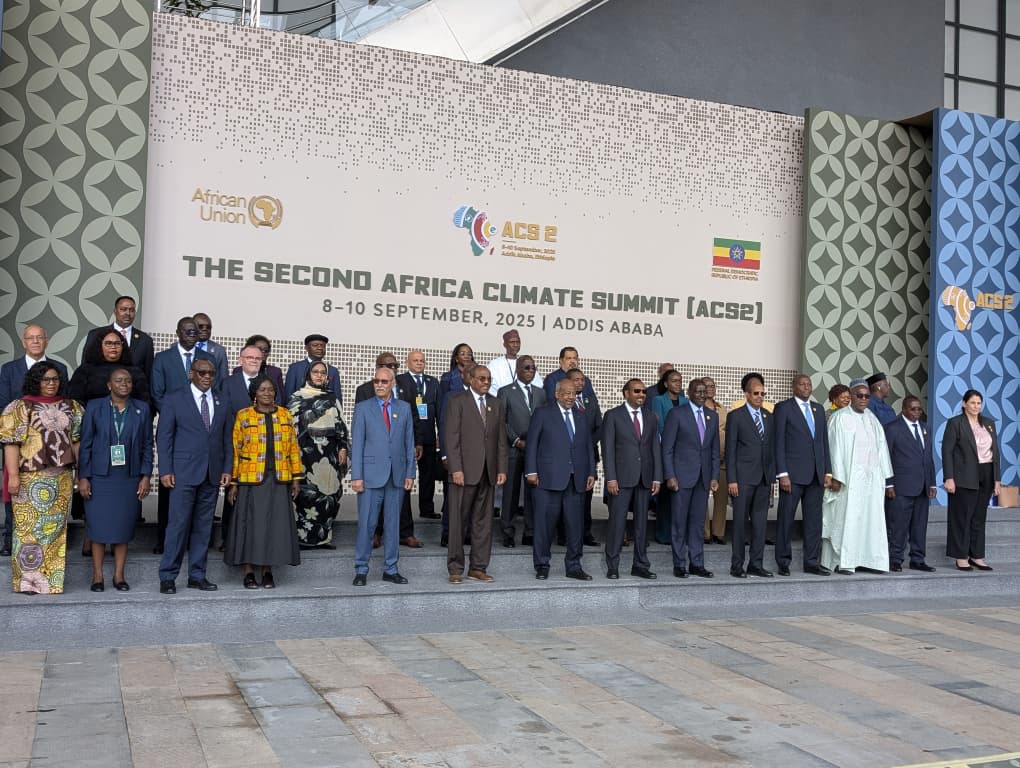The Second Africa Climate Summit (ACS2), held from September 8–10, 2025, in Addis Ababa, Ethiopia, has emerged as a defining moment for Africa’s climate agenda.
Hosted by the Government of Ethiopia in collaboration with the African Union (AU), the summit has convened over 25,000 stakeholders, including heads of state, policymakers, scientists, youth activists, and investors, under the theme “Accelerating Global Climate Solutions: Financing for Africa’s Resilient and Green Development.”
As the world prepares for COP30 in Belém, Brazil, in November 2025, ACS2 has set the stage for Africa to assert its role not just as a victim of climate change but as a powerhouse of innovative solutions and climate leadership.
A Unified African Voice for Climate Justice
Africa, despite contributing only 3.7% of global greenhouse gas emissions, bears the brunt of climate change impacts, from severe droughts to devastating floods.
ACS2 built on the momentum of the inaugural 2023 Nairobi Declaration which called for global financial reforms and increased climate finance.
The 2025 summit is set to conclude with the Addis Ababa Declaration, a unified African position emphasising equitable climate finance, technology transfer, and just energy transitions.
This declaration is set to guide African negotiators at COP30, ensuring the continent’s priorities are central to global climate negotiations.
The summit highlights Africa’s unique position: home to the world’s youngest population, vast renewable energy potential, and innovative local solutions.
Ethiopia’s Minister of Planning and Development, H.E. Dr. Fitsum Assefa, emphasised, “Africa is a victim of climate change, but it is also providing climate solutions.”
Key Themes and Outcomes of ACS2
1. Scaling Up Climate Finance
Climate finance remains a critical issue for Africa, where adaptation costs are estimated at $250 billion annually by 2030.
ACS2 reiterated the demand for the New Collective Quantified Goal (NCQG) of at least $1.3 trillion annually by 2030, with funds delivered as grants rather than loans to avoid worsening debt burdens.
The Addis Ababa Declaration also pushes for debt-for-climate swaps and reforms to global financial systems, echoing calls from the Nairobi Declaration.
2. Just Energy Transitions
Africa faces a dual challenge: leveraging its vast fossil fuel and mineral resources while transitioning to renewable energy to meet growing energy demands.
ACS2 underscores the need for a “just transition” that balances economic development with climate goals. Countries like Mozambique, Angola, and Nigeria are investing in solar, wind, and hydro while responsibly managing gas projects.
For context, IEA Africa Energy Outlook highlights the continent’s renewable potential, especially in solar energy, as critical to achieving both growth and emissions goals.
READ ALSO:
How the 2nd Africa Climate Summit (ACS2) Could Reshape Global Climate Finance
3. Adaptation and Resilience
With climate disasters costing African countries 2–5% of GDP annually, adaptation is a matter of survival. ACS2 emphasises the Global Goal on Adaptation (GGA), demanding that at least 50% of climate finance be allocated to adaptation initiatives.
4. Loss and Damage Fund
The operationalisation of the Loss and Damage Fund at COP28 was a significant win for Africa, but its implementation remains incomplete. ACS2 calls for clearer financing pathways and capacity-building to ensure funds reach affected communities.
The Road to COP30: Africa’s Priorities
As COP30 approaches, ACS2 has clarified Africa’s negotiating stance. The continent will push for:
- Ambitious Climate Finance: Scaling up the NCQG to $1.3 trillion annually by 2030.
- Technology Transfer: Ensuring African nations have access to renewable energy technologies and climate-smart solutions to implement their Nationally Determined Contributions (NDCs).
- Just Transitions: Context-specific energy transition pathways that allow Africa to leverage its resources while investing in renewables.
- Nature and Biodiversity: Bringing nature-based solutions into global climate strategies, as highlighted by the UNEP reports on financing nature.
- Global Solidarity: Stronger commitments from developed nations to meet their $100 billion annual pledge.
Why ACS2 Matters for Global Climate Action
ACS2 is more than a regional event; it’s a global call to action. Africa’s young population, vast natural resources, and innovative solutions position it as a cornerstone of global climate resilience.
As UN Climate Change Executive Secretary Simon Stiell noted, “When all nations are empowered to take bold climate actions, this strengthens the entire global economy.”
By amplifying African-led solutions, ACS2 challenges the narrative of Africa as a passive victim, instead showcasing its potential to drive green development.
Ronnie Paul is a seasoned writer and analyst with a prolific portfolio of over 1,000 published articles, specialising in fintech, cryptocurrency, climate change, and digital finance at Africa Digest News.


